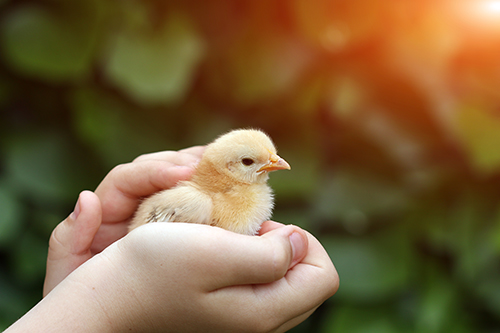Raising Baby Chicks
Mar 22, 2021

Raising chicks is a rewarding experience for first-time owners and experienced farmers alike. For those wanting to get started raising their own livestock, chickens provide a manageable way to achieve this, with the added benefit of fresh eggs. Maintaining chickens is a relatively easy task, but challenges often arise when helping baby chicks get to this point. Careful preparation and care will ensure that your babies grow into healthy adults that can thrive in a communal coop environment.
Consider these helpful tips when raising your chicks at home:
Set up a brooder before your chicks arrive and ensure that it is warm and draft-free. The size of your brooder will vary depending on the number of chicks you have, but aim to have at least one-half square foot of space per chick to avoid overcrowding and increase the space as the chicks grow. Fill the brooder with a layer of pine shavings and change out the dirty shavings every couple of days.
Use a red heat lamp to keep the brooder at a temperature of 95 degrees for the first two weeks. For every week after, reduce the temperature by 5 degrees until the chicks are about a
month old. You can regulate the temperature using a thermometer, but likely your chicks’ behavior is sufficient to tell if the temperature is right.
Give your chicks constant access to fresh food and clean water. Use shallow waterers to reduce the risk of your chicks drowning. If your chicks are not drinking, dip their beaks into the water to get them started. Chicks should be started on Co-op Chick Starter/Grower and then switched to a Co-op Layer feed or Co-op Scratch Grains when they are around nine weeks old.
At one to two weeks of age, chicks can be let outside for short periods of time. Gradually extend their time outside, which will help them make an easier transition to the coop later on. Just be sure to keep a close eye on them – they move fast!
At about six weeks of age, your chicks are ready to move to the coop, and you can expect to start finding eggs when your young hens are around four to six months old.
Co-op has all of the chick care supplies you need to help in this process, including chick starter feed, heat lamps, pine shavings, and more. Find the nearest location here.
For more content like this, check out the latest issue of the Cooperator.
Consider these helpful tips when raising your chicks at home:
Set up a brooder before your chicks arrive and ensure that it is warm and draft-free. The size of your brooder will vary depending on the number of chicks you have, but aim to have at least one-half square foot of space per chick to avoid overcrowding and increase the space as the chicks grow. Fill the brooder with a layer of pine shavings and change out the dirty shavings every couple of days.
Use a red heat lamp to keep the brooder at a temperature of 95 degrees for the first two weeks. For every week after, reduce the temperature by 5 degrees until the chicks are about a
month old. You can regulate the temperature using a thermometer, but likely your chicks’ behavior is sufficient to tell if the temperature is right.
Give your chicks constant access to fresh food and clean water. Use shallow waterers to reduce the risk of your chicks drowning. If your chicks are not drinking, dip their beaks into the water to get them started. Chicks should be started on Co-op Chick Starter/Grower and then switched to a Co-op Layer feed or Co-op Scratch Grains when they are around nine weeks old.
At one to two weeks of age, chicks can be let outside for short periods of time. Gradually extend their time outside, which will help them make an easier transition to the coop later on. Just be sure to keep a close eye on them – they move fast!
At about six weeks of age, your chicks are ready to move to the coop, and you can expect to start finding eggs when your young hens are around four to six months old.
Co-op has all of the chick care supplies you need to help in this process, including chick starter feed, heat lamps, pine shavings, and more. Find the nearest location here.
For more content like this, check out the latest issue of the Cooperator.